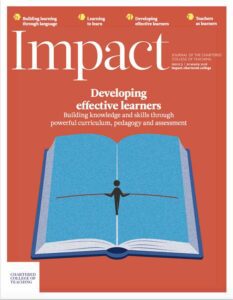Applying the Expert Learning Culture at Queen Anne’s School

All experts constantly reflect upon what they are doing and how they are progressing (Stobart, 2014). If our students are to be expert learners, they must be able to reflect upon and monitor their learning . For this, they need opportunities to assess their own strengths and weaknesses and set themselves challenging, but attainable goals. The more opportunities that students have to reflect on their learning, the more they will develop self-knowledge of their strengths and weaknesses so they can adapt their cognition, improve their motivation and facilitate their learning. These ideas are underpinned by the concept of metacognition, in that students become more knowledgeable of and responsible for their own thinking. Students who lack appreciation of their own strengths and weaknesses will be less likely to adapt to different situations and regulate their own learning in them. Accordingly, a lack of self-knowledge can be a constraint on learning (Pintrich, 2002).
To promote the learning journey at Queen Anne’s, we apply the principles of growth mindsetThe theory, popularised by Carol Dweck, that students’ bel (Dweck, 2006), that it is a person’s mindset, not their innate abilities or talents that ultimately determines their success. This is developed through our BrainCanDo (BCD) programme that aims to improve cognitive attainment, foster a love of learning and enable a healthy, productive approach to personal development. This programme is embedded in the school’s culture of a ‘no limits’ approach and is based on the understanding of brain function, brain plasticity and mindset. This knowledge is shared with the students so they understand they have the ability to rewire their brain to make themselves more resilient and better learners.
For this, the principles of metacognition are applied holistically by embedding opportunities, through the school’s tutorial system, for self-reflection with respect to academic attainment and attitude to learning. This is achieved through: the regular setting of academic SMART targets, based upon the school’s robust tracking and monitoring system; and the use of an ‘Attitude to Leaning’ audit that requires each student to reflect upon their own approach to learning in key standards that we believe are crucial to academic success and require deliberate practice. The tutorial system is inherent in our approach as it allows one-to-one discussions between each student and their tutor. This recognises that, for motivational reasons, self-assessment is most effective when done more privately, occurring between one teacher and one student (Pintrich and Schrunk, 2002).
To assist the students in monitoring their academic progress, a robust tracking system is used. This involves the use of the Centre for Evaluation and Monitoring (CEM) baseline test scores (Midyis, Yellis and Alis) along with the teacher’s professional judgement, to set subject specific attainment targets that are challenging but realistic. These are to be achieved by the end of the academic year. Each term the report grades are compared against the target grades and a traffic light system is used to indicate whether the student is on track to achieve their target. These findings are used in a number of ways for tracking and monitoring; in particular, the student and their tutor have a one to one discussion to analyse the findings to identify areas of weakness that can be targeted for improvement. From the discussion, two or three SMART targets are generated that are reflected upon at the next review stage.
The ‘Attitude to Learning’ audit developed at Queen Anne’s is an adaptation of the eight standards considered by Whitman and Kelleher (Whitman and Kelleher, 2016) to be critical to students’ academic success. These are based on Dweck’s advocacy of the growth mindset, as well as their school’s training in the neurodevelopmental framework of All Kinds of Minds (Whitman and Kelleher, 2016). The standards chosen for the Queen Anne’s School ‘Attitude to Learning‘ audit are: participation; note-taking; organisation; willingness to seek help; working collaboratively; and metacognition. For each standard, observable criteria are identified and the students are asked to rate themselves, with three alternatives: always; sometimes; and not at all. For example:
Participation: I am actively engaged in the classroom and participate appropriately in classroom activities and discussion: Always, Sometimes, Not at all
Once the students have reflected upon their approach to work, the school’s audit requires them to reflect upon their progress in each of the standards and provide supporting evidence for any areas in which the student can recognise that progress has been made. In addition, the students are asked to identify ways in which they can make further progress with one or more of the standards. On completion of the audit, the students have a one to one discussion with their tutor regarding progress in their ‘Attitude to Learning’ and the next steps to improve their self-efficacy and attitude to learning are agreed and recorded. The audit is conducted twice in the academic year to enable students’ time to implement their strategies and reflect upon their success.
By focusing the students’ self-assessment in the two strands of academic progress and attitude to learning, we believe that the students are very well supported in reflecting upon their strengths and weaknesses and developing learning strategies that are crucial to them becoming expert learners. This approach enables our students to achieve academic success and develop a lifelong enjoyment of learning.










